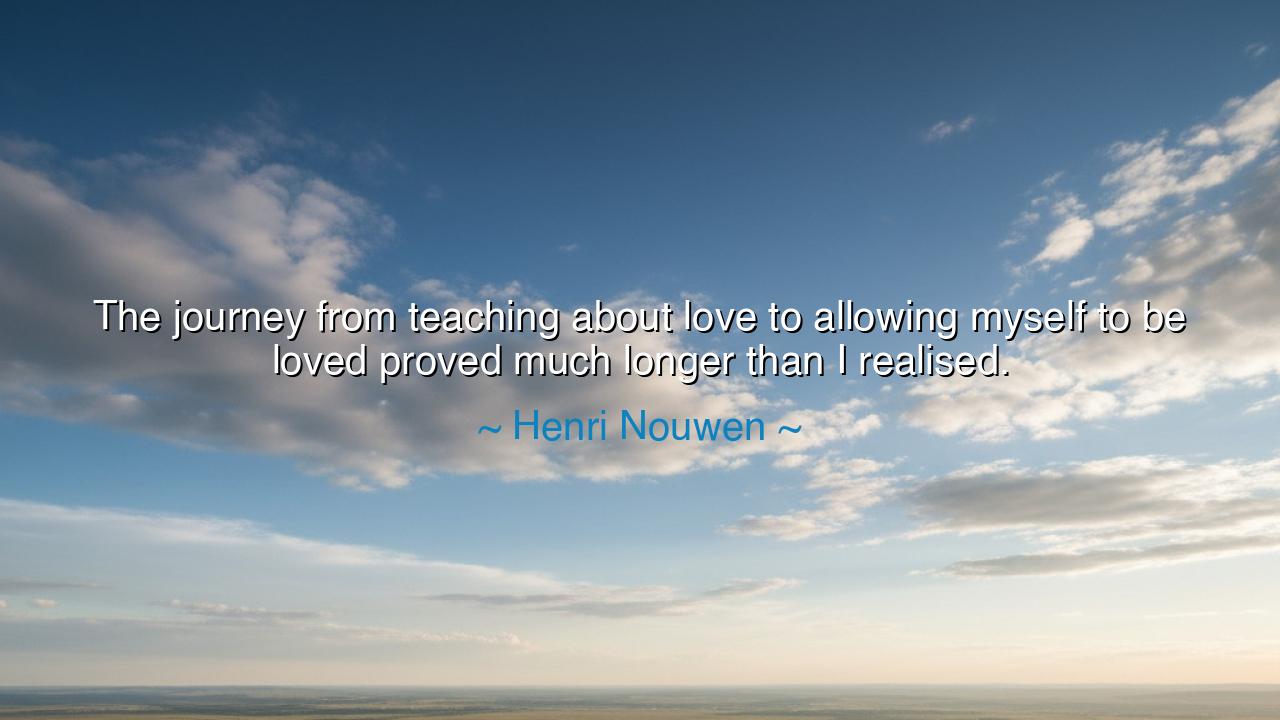
The journey from teaching about love to allowing myself to be
The journey from teaching about love to allowing myself to be loved proved much longer than I realised.






“The journey from teaching about love to allowing myself to be loved proved much longer than I realised.” – Henri Nouwen
So spoke Henri Nouwen, the gentle priest and mystic whose life was a bridge between intellect and heart, between the pulpit and the soul. In this confession — humble, honest, and deeply human — he unveils one of the greatest struggles of all: that it is easier to speak of love than to receive it. The words flow easily when we describe its beauty, its virtue, its necessity. But when love turns its gaze upon us — when it asks us to open our hearts and be vulnerable — many turn away. For to allow oneself to be loved is not an act of pride or mastery, but of surrender.
When Nouwen writes of his journey, he means more than time; he speaks of transformation. The mind may grasp the theory of love, but the heart must live it — and this, he learned, takes a lifetime. The scholar can analyze love, the teacher can preach it, the poet can praise it — yet none of these are the same as letting oneself be touched by it. To receive love, one must first believe oneself worthy of it. And therein lies the struggle. Many who give love freely cannot bear to receive it, for to do so is to face their own wounds, their own hidden unworthiness. Nouwen, who spent his life guiding others toward compassion, discovered in himself that same longing — and that same resistance.
The origin of this wisdom lies in his years of solitude and service. Though he taught theology at Harvard and wrote movingly of divine intimacy, his soul found its truest awakening not in lecture halls, but in silence — and later, in the humble care of the disabled at L’Arche community. There, among those who could not understand his books or his fame, Nouwen learned the truth he had once only taught: that love is not earned, it is received. The residents, with their unfiltered affection and trust, did not ask him to be wise or successful — only to be present, to let himself be loved as he was. It was a slow unveiling, the long journey from preaching love to accepting it.
Consider the story of St. Francis of Assisi, who once lived as a proud youth, preaching of virtue long before he understood humility. His transformation began not in grand sermons, but when he embraced a leper — the outcast he had always feared. In that moment, he did not teach love; he received it. For love, when truly lived, is not a doctrine to be mastered but a mirror — it reflects our own hearts back to us, asking, “Can you accept what you give?” Nouwen’s journey echoes that same sacred paradox: that to love deeply, we must also dare to be loved deeply.
The difficulty of this journey lies in the human wound of pride and fear. We fear rejection, so we build walls. We fear dependence, so we hide behind roles and achievements. We teach love so we do not have to feel its vulnerability. Yet, as Nouwen discovered, only when we open ourselves to the love of others — fragile, flawed, but sincere — do we begin to understand the love of God itself. Teaching love elevates the mind; receiving love redeems the heart.
It takes great courage to allow oneself to be loved, for it means letting go of control. It means standing unguarded before another soul and saying, “Here I am, imperfect, uncertain, but willing to be seen.” It means accepting care without earning it, forgiveness without explanation, tenderness without defense. This is why the journey is long — because it demands not strength, but honesty. And honesty, as Nouwen knew, is the purest form of faith.
So, my listener, remember this: it is not enough to know love as an idea — you must let it find you. Do not be content to teach others to love; open your own hands to receive it. Let those who care for you care into you. Let affection soften what intellect cannot heal. For the greatest wisdom is not to speak of love, but to live within it — to walk, as Henri Nouwen did, from the pulpit of understanding to the embrace of grace. And when that journey ends, you will see that what you sought to teach was always what you were meant to learn — that to be loved is the highest lesson of all.






AAdministratorAdministrator
Welcome, honored guests. Please leave a comment, we will respond soon